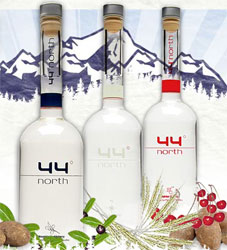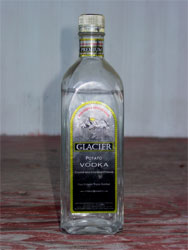Americans love vodka. But, over the years, most of the vodka consumed in the U.S. has come from European countries. Some aficionados think that grain vodka, usually made from wheat and rye, is far superior to those made from potato. Wheat vodkas such as Stolichnaya (from Russia) and Absolut (from Sweden) are extremely popular among American drinkers. Most potato vodkas are made in Poland. Yet American distilleries, many of which are considered to be micro-distilleries, are starting to turn out some clean-tasting vodka. Here’s a look at few domestic vodkas that rival their Euro counterparts.
1) Tito’s Handmade Vodka
 |
This micro-distillery, located in Austin, Texas, is quickly earning an allegiance for its grain vodka. Actually, distiller Tito Beveridge, a former geologist who worked for many years in the oil and gas business, makes his vodka from corn. So, this gluten-free spirit is the perfect choice for those with wheat allergies. The vodka is distilled six times in old-fashioned pot stills, and then it goes through a charcoal-filtration system. The end result is ultra-smooth vodka with a clean finish. Tito’s Handmade Vodka is becoming more popular, meaning that you can now find it in more liquor stores throughout the U.S.
2) Skyy Vodka
 |
Skyy Vodka is hands-down the most popular American-made vodka. This San Francisco-based distillery has grown into a rather large operation since opening in 1992. Skyy makes its vodka from various grains, like barley and wheat. Before it’s bottled, the vodka gets distilled four times and filtered three times–to ensure ultimate smoothness. Skyy has taken full advantage of the flavored vodka market by putting out several remarkable infused spirits, including ones flavored with pineapple, citrus, ginger and cherry, to name a few. Check out the distillery’s newest premium vodka, Skyy90, next time you are craving a straight shot of chilled vodka.
3) 44° North Vodka
 |
It’s no secret that Idaho is known for growing potatoes. So it only makes sense that distilleries in the Gem State make vodka from the prized spud crop. 44° North Vodka is made in Rigby, Idaho, in the shadow of the Rocky Mountains. Besides using russet potatoes, this small distillery in eastern Idaho also uses other Idaho ingredients such as huckleberries and rainier cherries in its infused vodkas. These potato vodkas are given just an essence of fruit, making for a smooth product that is not overpowered by sweetness. The distillery also produces grain vodka, Magic Valley Wheat, which is made with winter wheat from the extremely fertile soil of the Snake River Plain. 44° North Vodka products are now widely available throughout the U.S.
4) Teton Glacier Vodka
 |
Teton Glacier Vodka is another Idaho potato vodka that is raising eyebrows. Produced in Rigby, Idaho, Teton Glacier is made from russet potatoes that are grown in the area. Master distiller Pat Wernimont takes the modern approach to vodka distilling by using a four-column continuous distillation process, which is believed to raise the proof of the alcohol and remove all impurities from the vodka. This contemporary technique varies greatly from the old-fashioned pot-still process, making for full-bodied yet silky vodka. This incredible smoothness also has something to do with the distillery’s unique filtration process: the vodka is filtered through charcoal and garnet crystals. Garnets and potatoes? What do you expect from vodka that’s made in the Gem State?
5) Koenig Potato Vodka
 |
Koenig Distillery, a micro-distillery on the banks of the Snake River, in southwest Idaho, favors the old-school European method for making potato vodka. The distillery’s German-made (hand-hammered) copper pot stills produce super-smooth tasting vodka that finishes clean. Master distiller Andrew Koenig handcrafts his spirits using exacting European techniques. This vodka is wonderful by itself (preferably chilled), and it also pairs well with a green olive in a martini. The distillery also produces Austrian-style fruit brandies, made from estate-grown fruit, as well as a variety of Rhone Valley-influenced wines –made by Greg Koenig, Andrew’s brother.
We always want to be transparent and honest about our article content. From time to time, we may link to products and services that compensate us for the referral. This does not affect your cost, but it does help us fund future content for this site.
